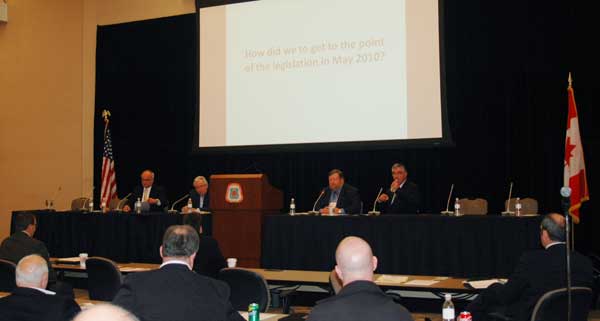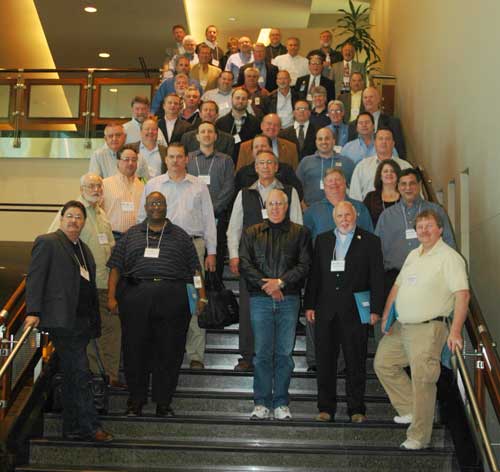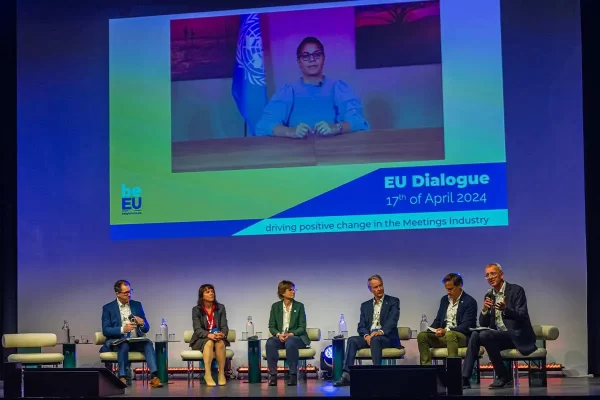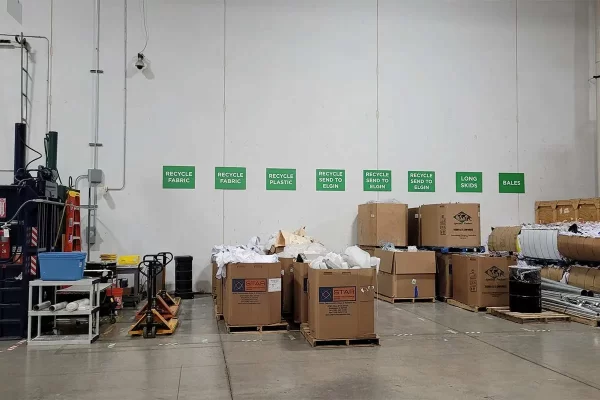On February 6-8, the United Brotherhood of Carpenters (UBC) hosted the 2012 National Labor Management Conference at its International Training Center in Las Vegas. The conference, held every four years, was sponsored by the Exhibition Services Contractors Association (ESCA), the Exhibitor Appointed Contractor Association (EACA) and the UBC.
Also held in 2004 and 2008, this meeting brings together UBC leaders and business agents working in the tradeshow industry with executive level management from general contractors and exhibitor appointed contractors who employ carpenters to perform tradeshow labor.
“The Carpenters do such a wonderful job of hosting this event in such a great facility,” said Jim Wurm, executive director of the EACA. “They do a great job of training, and it is nice to have such a fantastic partner that invests so much in the tradeshow industry.”
The conference began with an opening session titled, Putting the Issues on the Table, and featured speakers Douglas McCarron, UBC general president, Chuck Grouzard, ESCA president and SVP of national sales for GES and John O’Shea, president of the EACA and director of field services for Czarnowski.
After he was introduced by Ken Viscovich, a national representative of the UBC, McCarron spoke about how the carpenters union continues to evolve as an organization.
“To succeed in today’s industry, we need to seek out better, smarter and more productive ways of doing business because when it comes to winning work, doing business is what it is all about,” said McCarron. “We know that the real world needs more give and take, so we work with our contractors in order to keep everyone at work. That kind of approach is why our priorities go beyond membership and man hours. At every level, we strive to become smarter professionals and a smarter organization.”
After the opening session, Doug Ducate, president and CEO of the Center for Exhibition Industry Research, gave an overview of the industry in the first keynote presentation of the day.
In the second keynote, Randy Eppard, the director of education for the UBC International Training Center, talked about the importance of customer service training for the carpenter’s membership and the industry as a whole.
As the afternoon sessions began, Terrance McGann, legal council for the UBC, led attendees along a path that explored the legal battles the UBC fought against the state of Illinois after it passed legislation that reformed the labor rules at McCormick Place in May 2010.
On June 3, 2010, the Chicago Regional Council of Carpenters and the Teamsters Local 727 filed a lawsuit against the state of Illinois.

Ultimately, the courts ruled in the favor of the labor unions. As a result, both sides met at the negotiating table and started working on a settlement agreement that would reduce costs for the exhibitors at McCormick Place, which was the goal of the legislation in the first place.
“We negotiated something that was fair to the carpenters who were displaced because of the work rule changes,” said McGann. “We negotiated something that accommodated the industry and allows tradeshows to come back to Chicago. We probably negotiated something that we could have negotiated from the very beginning, but we needed everybody to come together.”
After McGann’s presentation, Frank Libby, president of the Chicago Regional Council of Carpenters, Dave Causton, general manager of McCormick Place, Doug Van Ort, a senior vice president for Freeman, and John O’Shea, who was also a speaker at the opening session, answered questions during a panel discussion about the McCormick Place labor reforms and subsequent settlement agreement.
“I anticipate more changes at McCormick Place,” said Causton. “I think that it is also possible to have course corrections, but I don’t think that we are going to be seeing the major changes that we talked about with the legislature.”
Libby also hoped that major changes at McCormick Place will not be necessary, but said it won’t be determined until after an audit process that has been in place since the settlement agreement.
“We are watching these audits very closely,” said Libby. “The mayor has asked me to give him a narrative of what we see in the audits and I certainly hope (major changes) are behind us, but I still have my doubts.”
On the final day of the conference, Frank Marino, director of health and safety for Czarnowski, delivered the opening keynote about tradeshow safety. Marino spoke about the difference between training and education, pre-planning to reduce hazards and Czarnowski’s zero accident program.
Marino said that Czarnowski has been really focusing on the pre-planning aspect of tradeshow safety.
“This is not just an effort to reduce accidents, because it will also increase efficiencies,” said Marino. “When we look at the schedule, things get tight. Ten hours before the show is when bad things are going to happen. That is when it becomes ‘we’ll do whatever we need to do to get it done.’ If we remove that (time crunch) from a planning perspective, then ultimately, we are all safer.”
After the safety keynote, Viscovich was joined by Larry Arnaudet, executive director of ESCA, and Jim Wurm, executive director of the EACA, as they gave attendees a progress report on the All Industry Summit.
The initial summit, which was held in October 2011, was a gathering of elected representatives from 16 tradeshow associations and organizations. The purpose of this first meeting was to identify some of the problems and issues that are common to the industry.
“The emphasis on the next meeting is that each organization that is represented is going to present their single largest issue that they deal with in the industry,” said Arnaudet. “Then we will all come together and come to a common agreement on what the major issues are that we, as a group, need to address.”
The next summit meeting is on February 24 in Atlanta, Ga.
After theupdate, Arnaudet gave attendees and update on the activities of the ESCA, which includes publishing a guide to labor jurisdictions at different facilities.
As the conference came to a close, Viscovich thanked everyone for participating and attending the event.
“Hopefully this is an event that you all look forward to, and we’ll see you again next time,” said Viscovich.






























